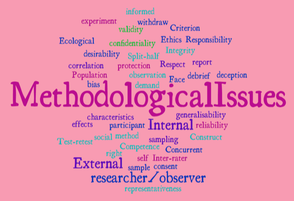|
Ethnocentrism is a methodological issue which appears in Paper 3
| |||||||
Summary of the Debate
Ethnocentrism
- Severe ethnocentrism: belief that one’s own group (ethnic, social, cultural) is the most important
- Softer ethnocentrism: people from 1 certain culture find it difficult to think outside their own cultural experience
- Sampling may lack generalisability
- Research design / conclusions may makes sense to their own cultural group, but may have little meaning to other cultural groups.
|
Don't worry that the clip says AQA - it is just as relevant to OCR
|
|
Key Terms
Alpha bias = assumes that cultural groups are profoundly different, and so these differences must always inform psychological research and understanding.
Beta bias = ignores / minimises cultural differences and all people are assumed to be the same, resulting in universal research designs and conclusions that mistakenly assume that all cultures are the same.
Cultural bias = the tendency to judge people in terms of one's own cultural assumptions.
Culture = the values, beliefs and patterns of behaviour shared by a group of people.
Emic approach = looks at behaviour from the inside.
Ethnocentrism = seeing the world only from one’s own cultural perspective, and believing that this one perspective is normal and correct.
Etic approach = looks at behaviour from the outside
Alpha bias = assumes that cultural groups are profoundly different, and so these differences must always inform psychological research and understanding.
Beta bias = ignores / minimises cultural differences and all people are assumed to be the same, resulting in universal research designs and conclusions that mistakenly assume that all cultures are the same.
Cultural bias = the tendency to judge people in terms of one's own cultural assumptions.
Culture = the values, beliefs and patterns of behaviour shared by a group of people.
Emic approach = looks at behaviour from the inside.
Ethnocentrism = seeing the world only from one’s own cultural perspective, and believing that this one perspective is normal and correct.
Etic approach = looks at behaviour from the outside
|
Further / Wider Reading for Oxbridge and Russell Group Candidates
Want to know more about this? Click here for an article discussing this further. |


